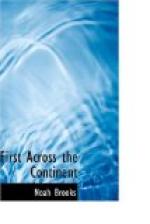“The northwest wind rose so high at eleven o’clock that we were obliged to stop till about four in the afternoon, when we proceeded till dusk. On the south a beautiful plain separates the two rivers, till at about six miles there is a piece of low timbered ground, and a little above it bluffs, where the country rises gradually from the river: the situations on the north are more high and open. We encamped on that side, the wind, the sand which it raised, and the rapidity of the current having prevented our advancing more than eight miles; during the latter part of the day the river became wider, and crowded with sand-bars. The game was in such plenty that we killed only what was necessary for our subsistence. For several days past we have seen great numbers of buffalo lying dead along the shore, some of them partly devoured by the wolves. They have either sunk through the ice during the winter, or been drowned in attempting to cross; or else, after crossing to some high bluff, have found themselves too much exhausted either to ascend or swim back again, and perished for want of food: in this situation we found several small parties of them. There are geese, too, in abundance, and more bald eagles than we have hitherto observed; the nests of these last being always accompanied by those of two or three magpies, who are their inseparable attendants.”
Chapter VIII — In the Haunts of Grizzlies and Buffalo
Game, which had been somewhat scarce after leaving the Yellowstone, became more plentiful as they passed on to the westward, still following the winding course of the Missouri. Much of the time, baffling winds and the crookedness of the stream made sailing impossible, and the boats were towed by men walking along the banks.
Even this was sometimes difficult, on account of the rocky ledges that beset the shores, and sharp stones that lay in the path of the towing parties. On the twenty-eighth of April, however, having a favorable wind, the party made twenty-eight miles with their sails, which was reckoned a good day’s journey. On that day the journal records that game had again become very abundant, deer of various kinds, elk, buffalo, antelope, bear, beaver, and geese being numerous. The beaver, it was found, had wrought much damage by gnawing down trees; some of these, not less than three feet in diameter had been gnawed clean through by the beaver. On the following day the journal has this record:—
“We proceeded early, with a moderate wind. Captain Lewis, who was on shore with one hunter, met, about eight o’clock, two white (grizzly) bears. Of the strength and ferocity of this animal the Indians had given us dreadful accounts. They never attack him but in parties of six or eight persons, and even then are often defeated with a loss of one or more of their party. Having no weapons but bows and arrows, and the bad guns with which the traders supply




